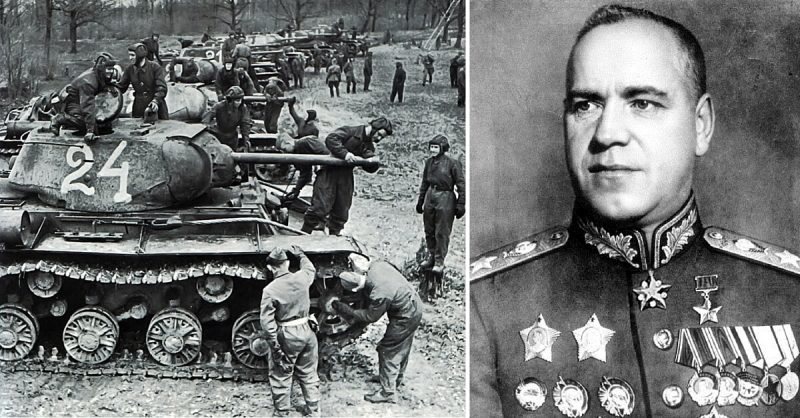There is not one singular, conclusive reason for the decisiveness of the role of the USSR in the eventual defeat of Nazi Germany – more so an amalgamation of factors that together proved significant.
In this article, we look at the most important persons and battles on the Eastern Front
Joseph Stalin
Joseph Stalin was one of the founding members of the Bolshevik party who in 1917, along with the Soviets, gained power of Russia during ‘Red October’, the Russian Revolution and subsequently gave birth to the world’s first self-proclaimed socialist state. This created a time of civil war between pro-revolutionary Reds and counter-revolution Whites. By 1922, the Red Army had celebrated numerous victories within territories of the former Russian Empire and therefore the USSR was consequently formed unifying Russian, Transcaucasian, Ukrainian and Belarusian states. In this same year, Stalin was appointed General Secretary of the committee and some claim his plans began to conspire due to this appointment. After Lenin’s death in 1924 Stalin set about claiming the USSR for himself, subsequently beating off and effectively murdering any political opposition. His ploy of spreading the power he already had over the state was a success until he effectively became the new leader of the Soviet Union.
Surprisingly, during the interwar period, Stalin helped to transform the Soviet Union from an agrarian society into a newly industrialised nation with the central notion of ‘Socialism in One Country’. Subsequently, he industrialised and collectivised the Soviet Union, carrying it strongly into the 20th century ready to compete with other superpowers. However, this came at a cost for anyone opposing his ideas and reforms, as well as many of the peasantry within the Soviet Union’s expanse. The transformation coincided with the imprisonment of millions of people into Gulag forced labour camps and a mass famine known as the Soviet famine of 1932-33 and later, the ‘Great Russian Purge’.
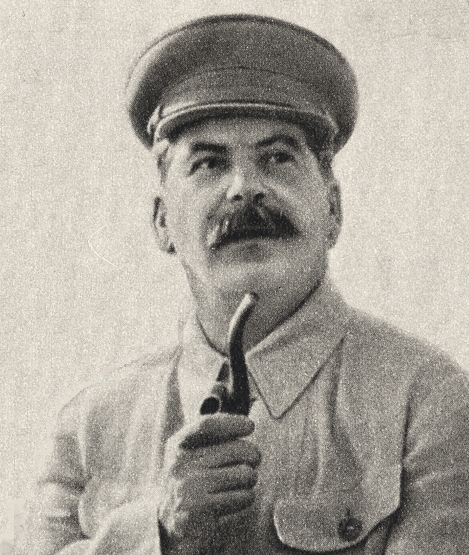
This purge, whereby Stalin and his comrades set about imprisoning, exiling or executing millions of so-called ‘enemies to the state’ was testament to Stalin’s radical nature. All over the Soviet Union, politicians, government officials and army generals were all victims to Stalin’s plot, utilised to gain full power over the USSR, to further wipe out any opposition to his rule and to bring the Soviet Union under one sphere of influence. The years prior to WWII and Stalin’s systematic nature of dictatorship set the precedent of which the war would be conducted and of future affairs until Stalin’s death in 1953.
As WWII in the Soviet Union began the country laid prey to Stalin, as his orders were absolute. Stalin himself took full control of the Armies with the ultimate say in all matters. The entirety of the Soviet Union remained afraid of their ruler – from regular citizens to the highest generals, people felt entirely obliged to follow a leader that would send them and their families into exile, a Gulag or to death if they disobeyed his command. For Stalin his plans were absolute, his unconditional command was achieved and now he could progress with the war as he saw fit.
As the war progressed, Stalin’s obsession with Hitler grew stronger – some say the battle between millions of men and subsequently millions of lives propagated into a personal battle between the two leaders, and especially on that of the side of Stalin. As the war continued and more and more Soviets lost their lives, Stalin grew more and more weary of those around him, generals on the front line and those who didn’t follow his orders.
Due to the mass fear of the Soviet leader, by people of all manner within the Soviet Union, the insistence by Stalin to beat Hitler – perhaps as a personal victory but also for Soviet-communist victory and the growing mentality that ‘not one step backwards’ was right – the Soviet dogged and relentless fighting continued. Stalin’s insistence and perseverance lacked thought with regards to human life and value of Soviet life, but without this relentless battle ideology the Soviets would have surely been beaten, or surrendered like so many other nations had done so before them. This crazed man, determined to beat Hitler, and a fascist Germany and to do so by any means necessary effectively created, instilled and spurred on the fearless, unyielding and persistent remaining memory of the Red Army and the USSR throughout the war in the East.
Zhukov
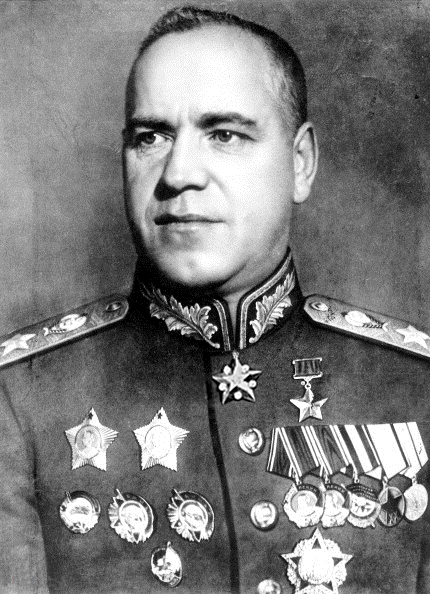
Georgy Zhukov was one of the Soviet Union’s most formidable Generals and remains today the most decorated officer in the history of the Soviet Union. Zhukov was held in high esteem by Stalin and his battlefield tactics, number and scale of victories carried him as one of the great generals of WWII. Other famous generals such as Bernard Montgomery (Britain) and Dwight D. Eisenhower (U.S) recognized and praised the general’s contribution to the allied war effort and celebrated him as a Soviet hero.
Zhukov was decisive in the USSR due to his ability to take orders from Stalin and to dictate them to generals and army officers within the Red Army. Regularly he would adapt his armies and rationalise Stalin’s orders into achievable, suitable aims and targets where many men would have undoubtedly been scared or unwilling. Where many secretly despised Stalin a common admiration for Zhukov remained. His adaptability, courage and leadership were unprecedented within the Red Army. More so, Zhukov’s combat ability would inspire those around him, as his superior knowledge of battle and decisive and definitive decisions spurred many Red Army victories. His leadership truly did install belief and courage into soldiers from the highest generals to the lowest of private soldiers.
Due to Zhukov’s military ability and the inspiration installed into regular Red Army troops, he was definitely a decisive figure within the USSR and a main contributor to the eventual victory for the Soviets.
Counter-Offensive: Winter 1941
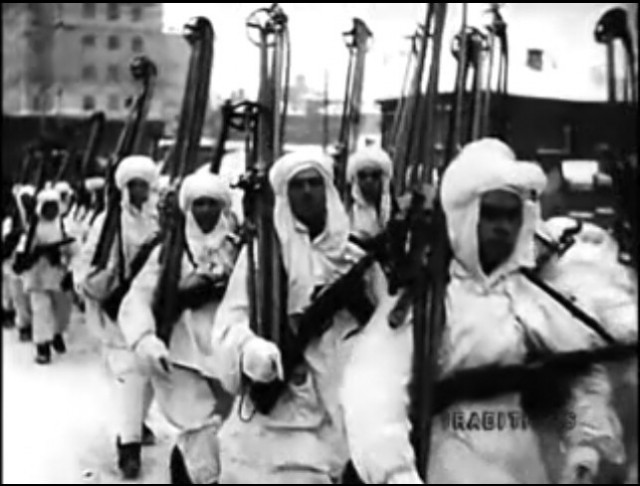
During the autumn of 1941, after the initial German onslaught through the summer months, the weather began to change. Stalin knew this was an important time for the Soviet Union and he began to gather fresh troops and equipment and ship it west from Siberia and the East. As the Germans drew closer and closer to Moscow the battles became more furious. The Soviets knew they had to utilize the winter – the worn out and fatigued Germans had to be stopped before they reached Moscow. Better prepared and newly grouped the Soviet armies performed a number of counter attacks and through December into January 1942 they successfully pushed the Germans away from their capital. On 7th January 1942 the attacks where complete and Moscow was safe. Arguably this is one of the most important and decisive attacks from the Soviets in the battles in the East. If Stalin had not brought new troops and supplies from the East, if the Soviets had not stopped the German war machine before they reached Moscow, the war could have been lost, and all before the Soviets had the chance to gather the larger armies and mechanised divisions they later employed throughout the campaign. Therefore the winter offensive of 1941-42 can be seen as a decisive battle against Nazi tyranny.
Stalingrad
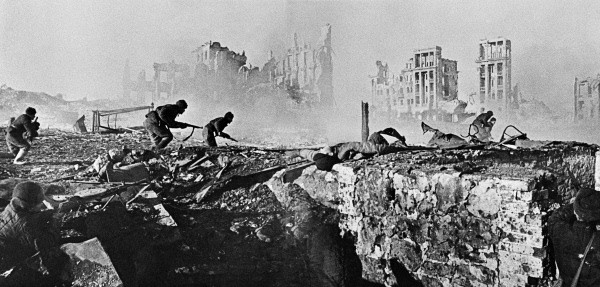
Stalingrad, the city which bore Stalin’s name, can also be seen as a decisive battle for the Soviets. The mind-set of the Germans was that if Stalingrad could be taken, then the Soviet Union would be split into two, the backbone of the nation broken and they would undoubtedly crumble. More so the symbolic nature of a victory over the Soviets for the Germans – taking the city named after their ruler would be an ideological victory, one that would spur the nation back home, the troops on the front and galvanise the final pushes towards victory. However, Stalin would not cave in, nor would the Red Army.
The city was pulverised by the Luftwaffe and nothing but rubble remained, but still, the Soviets continued to fight, to the last man. No amount of blood spilled was deemed unnecessary to ensure Stalingrad was not lost. Wave after wave of fresh troops entered the city in its defence and thousands died. The battle raged for months, through winter warfare and into the next year thereafter and decisively on the 2nd February 1943 the battle was declared as a Soviet victory. The Germans were left in shock and the ideological blow could arguably be seen as the tables finally turning.
Hitler was furious that his armies could not take the city and soon after his growing madness, distrust of those around him (like Stalin) and complete inability to look at the changing strategic military picture began to develop negatively and have more of an impact on events. Stalin and the Red Army, jubilant in victory, only grew stronger and thus began the preparations for new counter attacks to repel the German armies further back toward Germany. Stalingrad can be seen as decisive in many reasons, territorially, psychologically and from the high death toll. Thousands of men from both sides lost their lives at Stalingrad, however as more new fresh troops arrived into battle for the Soviets, finally the Germans were outnumbered, outgunned and subsequently losing the will to continue. Clearly, they could not match the sheer volume of troops the Soviets could muster and their force began to crack.
Kursk
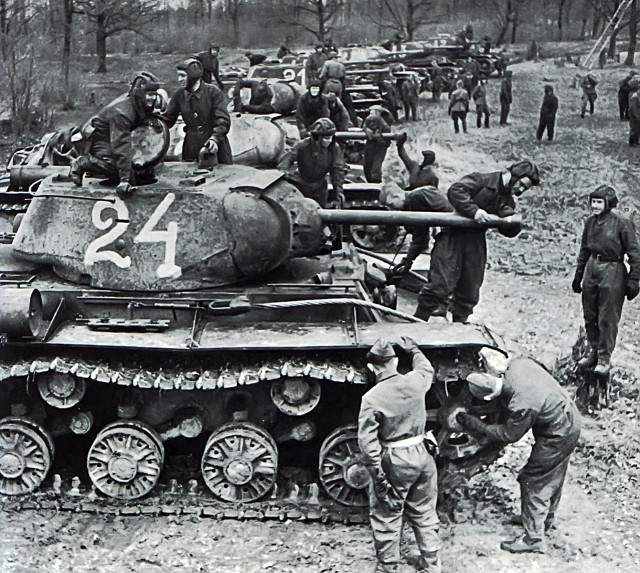
The battle of Kursk for the Germans was their last chance at a final attack to push the Soviet armies to breaking point – therefore it truly was ‘make or break’. The operation (codenamed ‘Citadel’) had to prevail – if it did not the Germans would undoubtedly be beaten and would have to retreat en masse. The Soviets on the parallel launched two operations (Operation Polkovodets Rumyantsev and Operation Kutuzov). The battle was one of the largest of WWII, known as the great tank battle involving more than 8,000 tanks and two million men. The Soviets however, largely outnumbered the Germans.
After one month and 18 days of some of the most brutal and horrific fighting seen in the war thus far the Soviet armies – outnumbering the Germans –prevailed, and as victory became conclusive the precedent was set for the remainder of the war. It was now evident that the Soviet armies proved superior to the Germans. The realisation of defeat for the Germans was so large that many saw only defeat for the future. Ideologically and physically the German armies were broken.
Prior to this battle, arguably the war was on a balance, with one army attacking and the other counter-attacking and so forth. The slightest tactical change could have thrown the war for either side. After Kursk, the war was only going in one direction and towards one outcome – Soviet victory.
About the Author
My name is David J. Armstrong (BA Hons) and I am a British military historian from Buckinghamshire. I graduated from university with a degree in War & Conflict in 2014. Since then I have been writing my first non-fiction book about ‘D-Day’ along with other short pieces as found on my blog. I will be attending university again in 2016 and studying towards my MA Degree in Military History with the hope of continuing on to my PhD in the same subject thereafter.
I love to research, learn and write about history. My specialist subjects and my real passions are the wars of the 20th century including WWI and WWII. You can find me as part of various historical associations such as the Historical Writers Association and you can also find me on twitter as @djahistory.
On my blog you will find a collection of work – things that I am working on (such as articles and reviews, historical volunteer work and articles for online sites and magazines), things that I have done in the past and things that generally interest me within history (Including historical sites and museums I visit, books I read and articles I am intrigued by).
